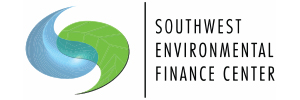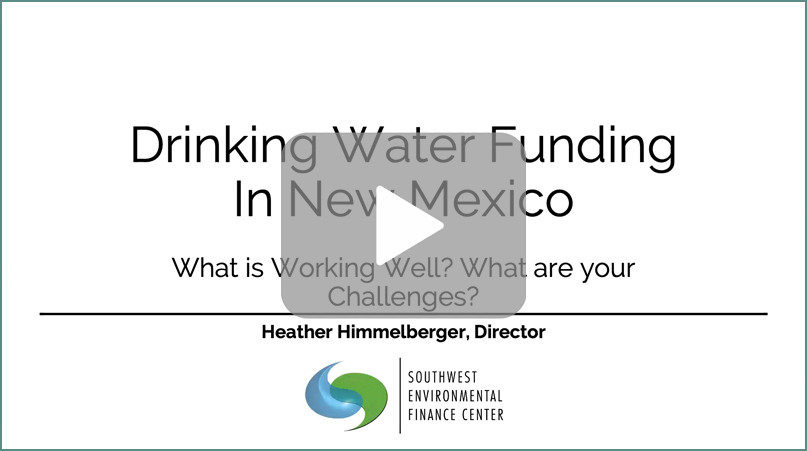Tribal Water Utility Survey
What is the purpose of this project
One of the most important aspects of sustainably managing your water system, is the ability to fund asset rehabilitations or replacements when needed. There are many state and federal funding sources available to help you meet your needs, but these programs may or may not be adequately meeting your needs. We, at the University of New Mexico, with funding from the Water Foundation, are conducting this study to better understand communities’ needs and concerns about drinking water funding – including what is working and more importantly, what is not. Our findings will be shared with the New Mexico state legislature so that your answers can help inform necessary revisions to the overall funding program within the State of New Mexico. We really need your help, through your responses, to gain as much information as possible.
The survey results, in an anonymous manner, will be analyzed and shared with the New Mexico State Legislature and state government agencies. The ultimate goal of the study is to inform decision makers and encourage them to consider any needed revisions to their governance of drinking water systems in New Mexico in order to promote ease of receiving grants and loans, help address principal challenges and concerns, and facilitate better system management.
Why should I participate in this project?
By participating in this research, you will significantly contribute to the efforts to understand funding for water projects and other related aspects of drinking water, with the ultimate goal of improving drinking water funding statewide. You will not be directly compensated in any way for your participation, although you do have our thanks.
What will the information I provide be used for?
The survey and follow-up interview results will be analyzed by our team of water research professionals. We will analyze the data for trends and correlations and share our data with law makers and other government officials.
How do I take the survey?
If you are a drinking water system employee we hope you will take the survey via the button below. To read more about the survey, click on the “Complete the Survey” tab on this website.
Unfortunately we are unable to provide a Spanish translation of this page. We apologize for any inconvenience this may cause.
The University of New Mexico
Southwest Environmental Finance Center
Heather Himmelberger
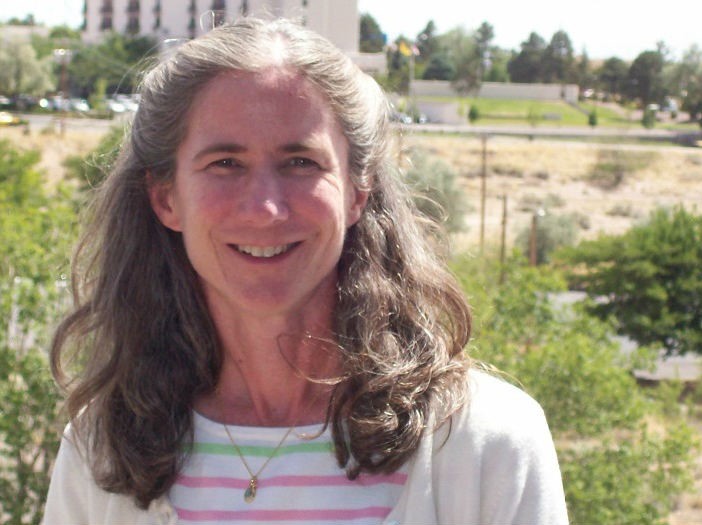
First Hidden Accordion
Your content goes here. Edit or remove this text inline or in the module Content settings. You can also style every aspect of this content in the module Design settings and even apply custom CSS to this text in the module Advanced settings.
Heather Himmelberger - Director
Heather Himmelberger is a registered professional engineer with 28+ years of experience working with water and wastewater utilities and in the environmental arena. She has a BS in Environmental Engineering from Penn State University and an MS in Environmental Engineering from Johns Hopkins University. She is currently working on a PhD in Civil Engineering at the University of New Mexico. She served as the Director of the NM Environmental Finance Center from 1996 to 2012 and became Director of the Southwest Environmental Finance Center in 2013. As Director, she has assisted state, local and tribal governments with the broad financial implications of providing environmental services, such as water and wastewater, and complying with state and federal regulations. Heather has served as an expert witness to EPA’s Environmental Financial Advisory Board (EFAB) and was appointed an official board member to EFAB in spring 2014. She is on two subcommittees, one related to small systems and compliance and the other related to affordability of wastewater. She has been a presenter at numerous national, international, regional, and local conferences, workshops, and meetings. Heather has been project lead on the Small Systems Managerial and Financial Capacity Assistance project funded by EPA in 2012 for the Environmental Finance Center Network, a project we call, “Smart Management for Small Water Systems” and is currently the co-PI of the seventh round of funding for the Smart Management for Small Systems project. In this capacity, she has provided trainings in all states and territories and has provided assistance to small communities in areas such as asset management, water loss, multiple funding, regionalization, and energy efficiency. She has also conducted 10 webinars for the first phase of the project. Heather has been providing training and implementation assistance in Asset Management since 2005. She coordinated and facilitated the first Asset Management users group in New Mexico in October of 2010 and completed an interactive Asset Management Training Manual that includes over 200 video clips and combines Asset Management with Energy Efficiency. She directed a project team that worked with 10 different groups of water systems to encourage collaborative efforts between the systems. She was a member of the Dona Ana County Water and Wastewater Alliance back in the late 1990s, which was one of the first collaborative efforts in the State of New Mexico. She helped these systems understand the benefits of mutual cooperation, and led this group to the formation of a regional water entity. She facilitated the meetings in Texas that lead to the formation of the Texas Water Infrastructure Coordinating Committee (TWICC). The TWICC includes all water and wastewater infrastructure funding groups as well as the Texas Commission on Environmental Quality. This group now meets quarterly to coordinate funding in Texas. Heather participated in New Mexico One Stop Shops, which were the mechanism of unified funding before New Mexico embarked on a unified funding application process. She has been involved in the workgroups that were developing unified approaches for Preliminary Engineering Reports and Environmental Documents so that communities could use one process that would satisfy all agencies. Heather has conducted numerous studies related to water loss which investigated water loss technologies and their applicability. In addition, she has worked on a Water Research Foundation project that is developing water loss training for small systems.
Francine Stinziano
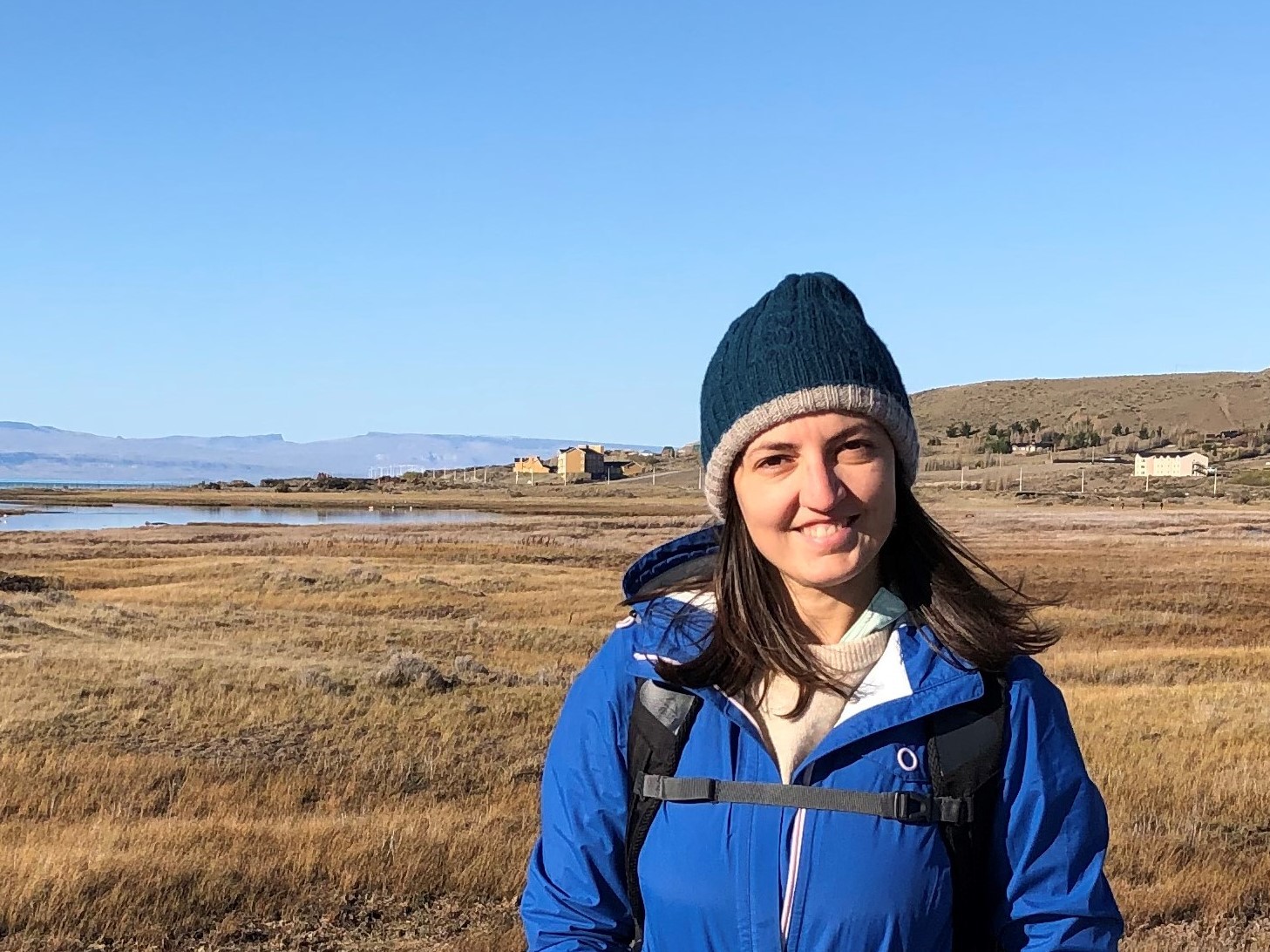
First Hidden Accordion
Your content goes here. Edit or remove this text inline or in the module Content settings. You can also style every aspect of this content in the module Design settings and even apply custom CSS to this text in the module Advanced settings.
Francine Stinziano - Program Manager
Francine first joined the Southwest EFC in 2016. She is an experienced logistics director and hands-on program manager with a knack for big-picture thinking. Francine is an experienced liaison across projects and teams, both internal and external, specializing in facilitation, stakeholder engagement, streamlined communications, and conflict resolution. Over the past decade, she has interfaced with utility operators and managers as well as state-level agency staff across the 50 states and 5 U.S. territories to ensure their continued access to resources, trainings, and technical assistance. She has been an integral part of Environmental Finance Center Network‘s multi-million-dollar Smart Management for Small Water Systems project funded by the U.S. EPA through a cooperative agreement since 2012 and has been a member of the management team since the inception of the program. In addition to project-related work, Francine provides financial and managerial oversight for the SW EFC’s $1.2 million annual operating budget and enjoys being the communications liaison between professional staff with diverse technical expertise. She holds a Master of Public Administration from the University of North Carolina at Chapel Hill, where she focused on organizational and change management, in addition to a Bachelor’s degree in International Studies from North Carolina State University. Francine thrives when empowering others through strategic thinking and visioning. Before joining the SW EFC, Francine was the Deputy Director for the Development Finance Initiative.
Matt Ziegler
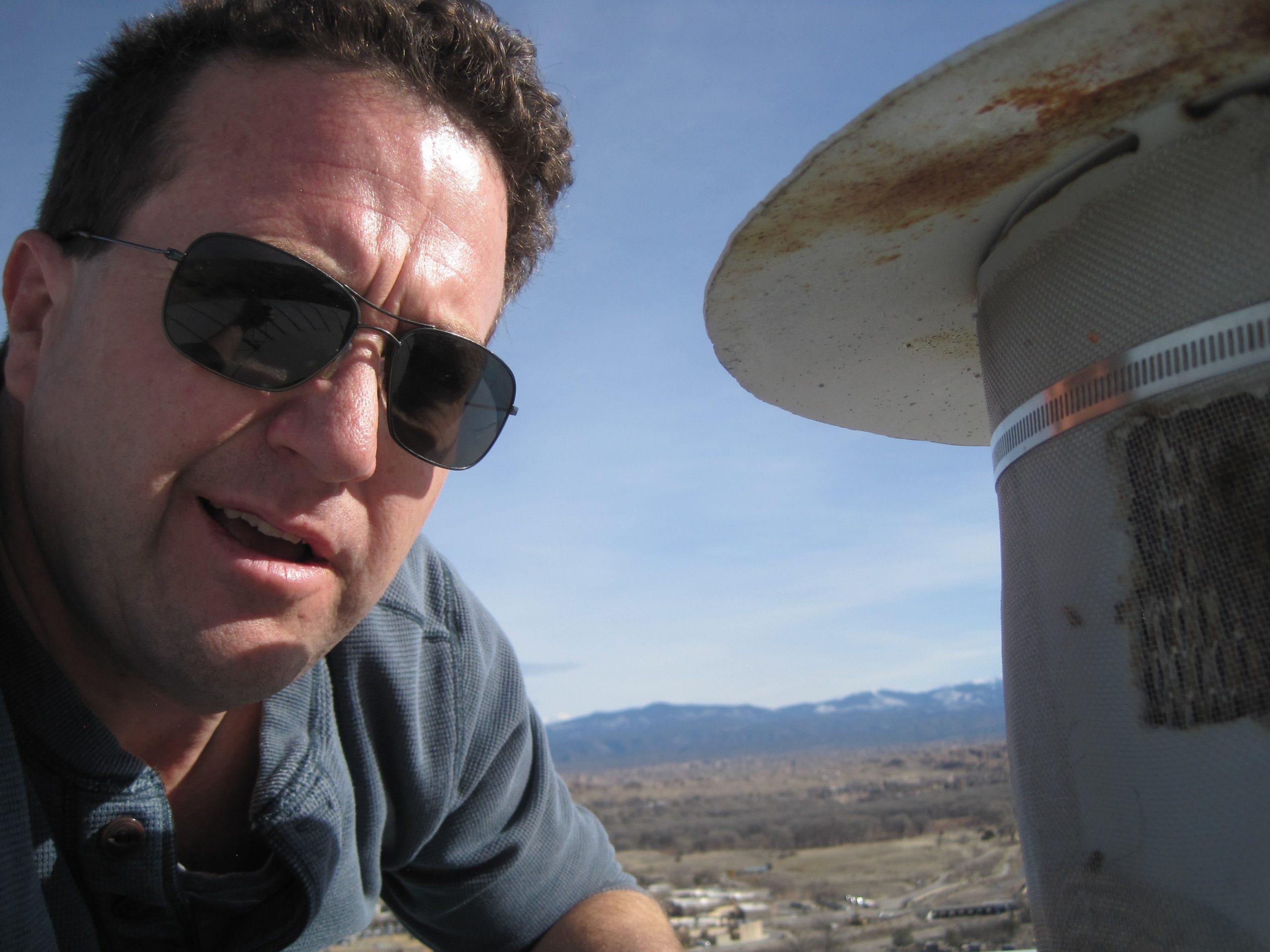
First Hidden Accordion
Your content goes here. Edit or remove this text inline or in the module Content settings. You can also style every aspect of this content in the module Design settings and even apply custom CSS to this text in the module Advanced settings.
Matt Ziegler - Tribal Drinking Water Program Director
Matt holds a B.S. from the University of Kansas and an M.S. from Texas A&M University. Since joining the NM EFC in 2004, and subsequently the SW EFC in 2013, he has worked on human health and environmental issues related to water and has a demonstrated ability in engaging with Tribal and non-tribal water professionals. He has worked with EPA Region 6 in coordinating the Direct Implementation Program for Tribes and Pueblos by providing direct technical support and assistance to over 80 tribal public water systems. He provides on-site compliance monitoring assistance, as well as phone and email support, and both on-site and classroom training to EPA Region 6 Tribes. He administers and oversees laboratory contracts for all compliance sampling for EPA Region 6 Tribes. Mr. Ziegler has experience in developing and implementing solutions to issues related to the National Primary Drinking Water Regulations and has been involved with the implementation of the Arsenic, Stage 2 Disinfection Byproducts, LT2, and Groundwater Rules. He has worked extensively and personally with Tribal water systems in EPA Region 6, developing close working relationships with Tribal managers and operators. In addition, he routinely works with those senior managers in tribal governments and at EPA who are responsible for resource protection programs. He is well versed in the SDWIS database and supports EPA with updating & maintaining the database. He assists EPA and Tribes with determining monitoring schedules and responding to violations of SDWA, and continues to participate in developing and implementing the EPA Region 6 Tribal Water Operator Certification Program.
Rose Afandi
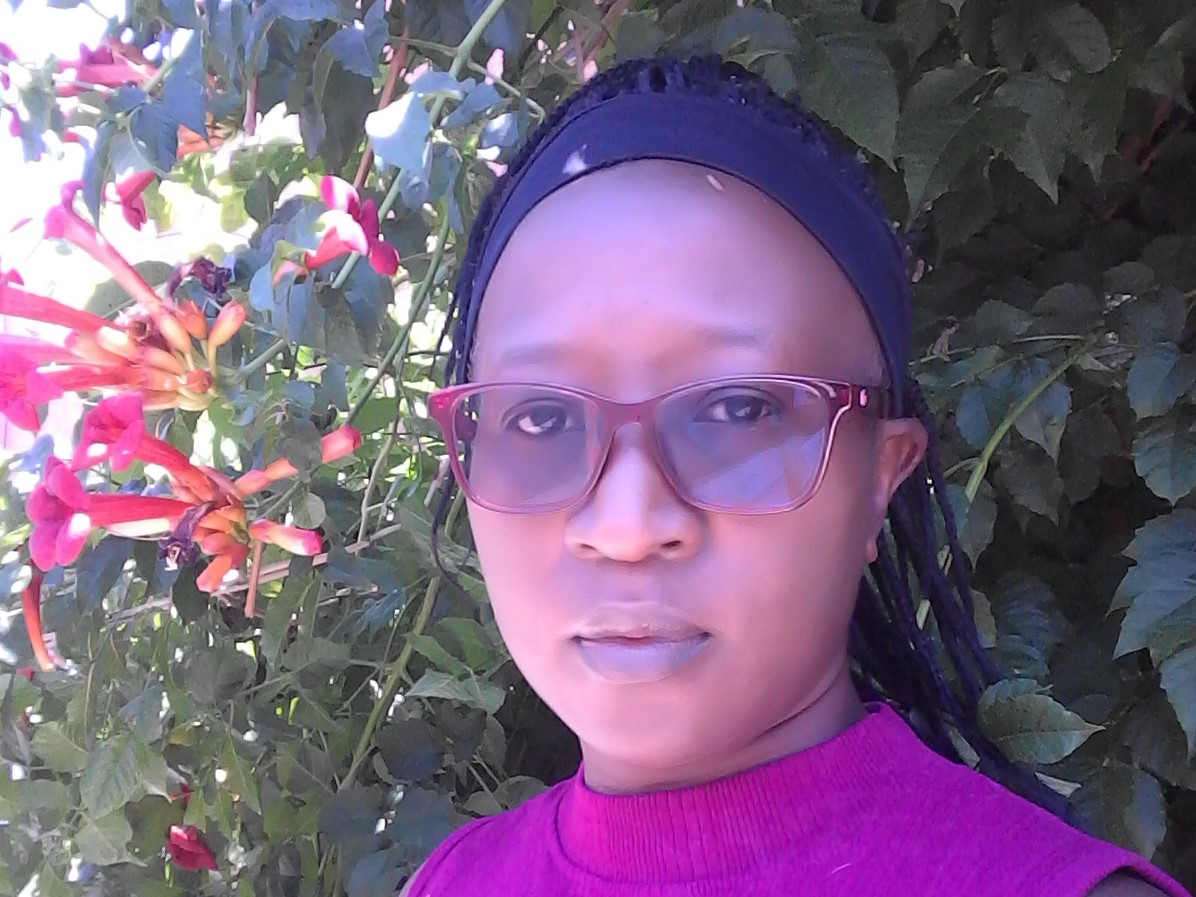
First Hidden Accordion
Your content goes here. Edit or remove this text inline or in the module Content settings. You can also style every aspect of this content in the module Design settings and even apply custom CSS to this text in the module Advanced settings.
Rose Afandi - Tribal Drinking Water Program Specialist
Rose joined the team in 2009. She holds dual B.S. degrees in Environmental Science and Biology and an MS degree in Water Resources from the University of New Mexico. She has over 10 years’ experience providing technical assistance to drinking water utilities. At the Southwest Environmental Finance Center (SW EFC), Rose assists Tribal water systems with implementation and compliance with the Safe Drinking Water Act (SDWA) Rules including sanitary surveys, the Groundwater Rule, Lead and Copper Rule (LCR), Revised Total Coliform Rule (RTCR), and others. She is involved with systems’ capacity development including development and implementation of training programs for the EPA Region 6 Tribal Water Operator Certification Program, emphasizing compliance with the SDWA. She trains and assists with annual Consumer Confidence Reports (CCRs) and coordinates the Tribal Water Operator Certification Program in EPA Region 8.
Luke Andrews
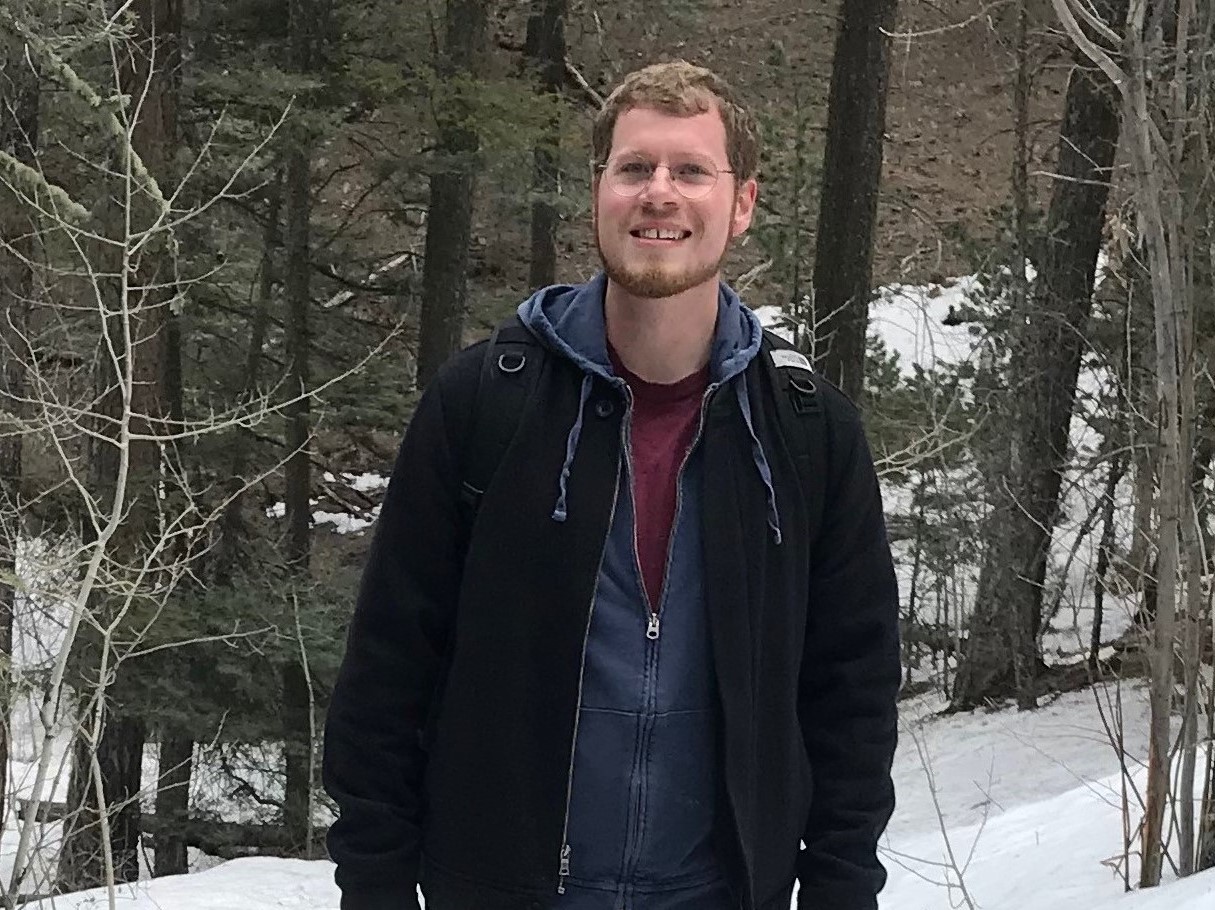
First Hidden Accordion
Your content goes here. Edit or remove this text inline or in the module Content settings. You can also style every aspect of this content in the module Design settings and even apply custom CSS to this text in the module Advanced settings.
Luke Andrews - Research Scientist
Luke holds a B.S. in Geography with a concentration in Geographic Information Systems (GIS) from The University of New Mexico. At the Southwest Environmental Finance Center, Luke collects and manages water utility GIS data, contributes to and develops GIS standard operating procedures, creates asset maps for water systems, contributes to risk assessment via spatial and data analysis, and performs water rates studies.
joni m palmer
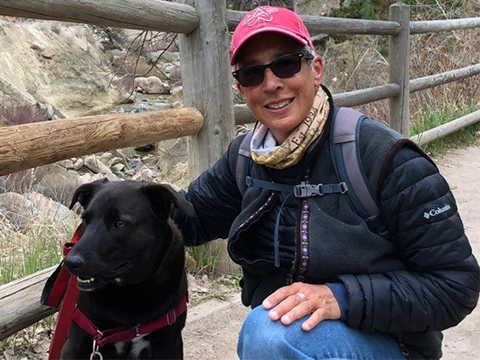
First Hidden Accordion
Your content goes here. Edit or remove this text inline or in the module Content settings. You can also style every aspect of this content in the module Design settings and even apply custom CSS to this text in the module Advanced settings.
joni m palmer - Research Assistant Professor
Dr. palmer earned her bachelor’s degree in Science at Cornell University, with a double major in City & Regional Planning, and Design + Environmental Analysis. She received her MLA at the Harvard University Graduate School of Design, and completed her doctoral studies in Human Geography (concentration cultural geography, urban geography, and geovisualizations) at the University of Colorado-Boulder.
For over 30 years her professional life has been a blend of practice and academia. Her professional practice experience in planning and design practice (working in both the public and private sectors) includes working for municipal, state and federal government, and private firms in Boston, Seattle and San Francisco. Her practice realms are research consultation, community engagement strategist, strategic planning, community and environmental planning, and arts and cultural planning.
Benjamin P. Warner
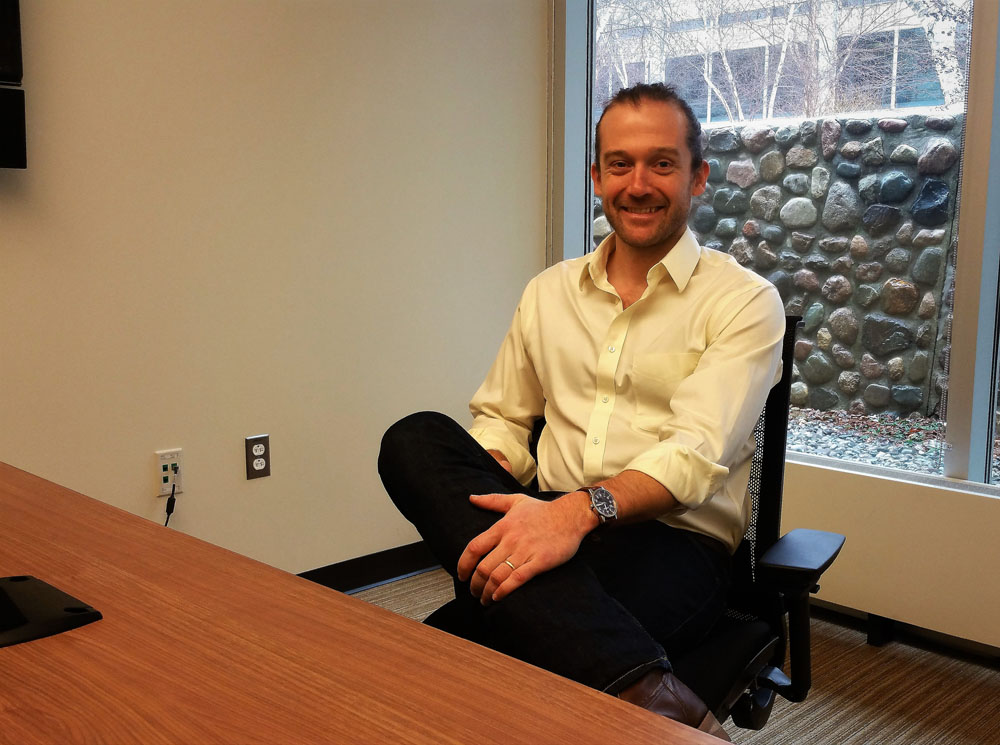
First Hidden Accordion
Your content goes here. Edit or remove this text inline or in the module Content settings. You can also style every aspect of this content in the module Design settings and even apply custom CSS to this text in the module Advanced settings.
Benjamin P. Warner - Assistant Professor
Benjamin leads the climate and human development research group at UNM. He joined the Department of Geography and Environmental Studies at The University of New Mexico in 2017. His research focuses geographically on Latin America, with additional emphases in Central America, and Southwestern and New England regions of the US. Thematically, his research is broadly defined as development geography, with specific topics including political theory; water governance and institutions; Central American development; agrarian adaptation in Central America’s “dry corridor;” vulnerability, risk, and adaptation to environmental change and globalization; political economy of climate adaptation programs; critical development studies; and mixed methods.
Tucker Colvin
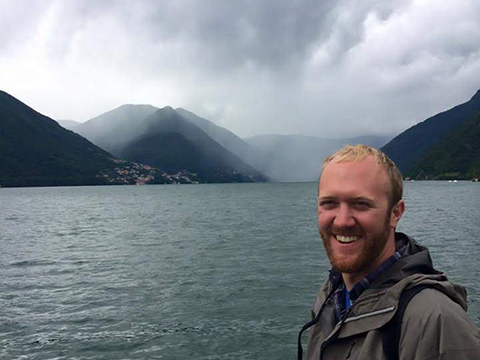
First Hidden Accordion
Your content goes here. Edit or remove this text inline or in the module Content settings. You can also style every aspect of this content in the module Design settings and even apply custom CSS to this text in the module Advanced settings.
Tucker Colvin - Research Scientist
Tucker Colvin earned his B.S. in Environmental Science from Montana State University in 2014 and his M.S. in Geography from the University of New Mexico in 2020. As a graduate student Tucker worked with the Climate and Human Development research group at UNM to identify the needs and challenges faced by rural drinking water systems in New Mexico and the governance and institutional structures that created them. Additionally, he researched how institutional structures treat populations differently. His thesis, titled Drinking Water Governance for Whom? An Institutional Analysis of Rural Drinking Water Systems in New Mexico, earned thesis distinction. Before graduate school, Tucker worked as a drinking water treatment plant operator in Bozeman, Montana. In this position we worked with SCADA systems, asset management plans, equipment maintenance, source water protection, regulations and compliance, water chemistry, and community relations. He maintains his Montana operator’s license. Tucker also has experience working in water and soil chemistry laboratories, teaching science and geography courses, and working in agriculture. In addition to his current work with SW EFC, he is serving as an AmeriCorps SeedCorps service member at Roadrunner Food Bank in Albuquerque, NM to help with New Mexico’s response to hunger during the Covid-19 pandemic and to work with geographic and demographic data to help the food bank better serve the state’s food insecure population.
Take the survey
About the survey
Likely one of the most important aspects of sustainably managing your water system is the ability to fund asset rehabilitations or replacements when needed. There are many state and federal funding sources available, but these programs may or may not be adequately meeting your needs. The University of New Mexico, with funding support from the Water Foundation, are conducting this study to better understand communities’ needs and concerns about drinking water funding – including what is working and more importantly, what is not. Our findings will be shared with the New Mexico state legislature so that your answers can help inform necessary revisions to the overall funding program within the State of New Mexico. You were selected to participate in this study because you are listed as a contract for a public drinking water system in New Mexico. You may not directly benefit from this research, but the knowledge gained will help us better understand drinking water needs and funding, and your input will be presented during drinking water policy discussions in New Mexico.
If you agree to take part in this study, please complete the survey below. The questions will take approximately to 20 to 30 minutes to complete. Your participation in this study is completely voluntary and you can withdraw at any time. You are free to skip any question you choose.
Your survey responses will remain anonymous. Your name and the name of the public water system you manage will remain anonymous in any report resulting from this study. Please answer questions to the best of your knowledge and as truthfully as possible. Your responses are very important to us and any individual response will not be associated with you or your water system in any information shared or published.
By proceeding to the survey questions, you are indicating that you have read and understand this project background and agree to participate in this research study. If you would like to request a paper version of the survey, please e-mail us at swefc@unm.edu.
Sincerely,
The research team at the Southwest Environmental Finance Center at UNM and its affiliates
Unfortunately we are unable to provide a Spanish translation of this page. We apologize for any inconvenience this may cause.
Grants
Grants are awarded for specifically designated purposes and do not require repayment. Although systems may regard grants as a more desirable option than loans, these funds may be very competitive, and their availability is diminishing. Many grants also require a loan in addition to the grant in order to fund an entire project. Each state and federal grant program has specific application procedures, eligibility requirements, and deadlines. It is also important to know that grants are not “free money.” The funds are coming from local, state, or federal tax revenues or from profits of private businesses or funds from non-profit organizations.
Loans
Loans entail repayments of principal and interest, although interest rates may be governmentally subsidized. Government loans typically involve relatively low transaction costs, and interest rates may be subsidized, particularly for small communities. Each state and federal loan program has specific application procedures, eligibility requirements, and deadlines. Commercial loans are more flexible than government loans but are typically more expensive for public and private borrowers. Commercial loans may be one of the few available options for privately-owned utilities, although in some states private borrowers may be eligible for state revolving loan funds. State and Federal Loans include U.S. Department of Agriculture, U.S. Environmental Protection Agency, State Revolving Loan Funds administered by the states, North American Development Bank, as well as other state specific sources.
Follow this link for a PDF table of New Mexico Water and Wastewater Funding Resources
Funding Resources available to New Mexico Water and Wastewater utilities PDF table.
Funding Resources Available to New Mexico Water and Wastewater utilities
Drinking Water State Revolving Loan Fund (DWSRLF)
Organization
New Mexico Finance Authority
Purpose or Use of Funds
The Drinking Water State Revolving Loan Fund is operated in partnership with the New Mexico Environment Department (NMED) to provide low-cost financing for the construction of and improvements to drinking water facilities throughout New Mexico in order to protect drinking water quality and the public health.
How to Apply
To be eligible for funding, a water system must first be placed on the Fundable Priority List. To be placed on this list, submit a Project Interest Form to the Drinking Water Bureau. The form can be accessed on the NMED-DWB website.
Contact
Todd Johansen
505-992-9654
207 Shelby Street Santa Fe, New Mexico 87501
Drinking Water State Revolving Loan Fund (DWSRLF)
Organization
New Mexico Finance Authority
Purpose or Use of Funds
The Drinking Water State Revolving Loan Fund is operated in partnership with the New Mexico Environment Department (NMED) to provide low-cost financing for the construction of and improvements to drinking water facilities throughout New Mexico in order to protect drinking water quality and the public health.
How to Apply
To be eligible for funding, a water system must first be placed on the Fundable Priority List. To be placed on this list, submit a Project Interest Form to the Drinking Water Bureau. The form can be accessed on the NMED-DWB website.
Contact
Todd Johansen
505-992-9654
207 Shelby Street Santa Fe, New Mexico 87501
Public Project Revolving Fund
Organization
New Mexico Finance Authority
Purpose or Use of Funds
The Public Project Revolving Fund is used to finance public projects such as water system upgrades and other infrastructure improvements.
How to Apply
For more information concerning the application process, contact the Public Project Revolving Fund.
Contact
Adam Johnson
505-992-9621
207 Shelby Street Santa Fe, New Mexico 87501
Water Project Fund
Organization
New Mexico Finance Authority
Purpose or Use of Funds
Under the Act, there are five project types eligible for consideration of financial assistance: 1. Water conservation or recycling, treatment or water reuse projects; 2. Flood prevention projects; 3. Endangered species act collaborative projects; 4. Water storage, conveyance or delivery projects; 5. Watershed restoration and management projects.
How to Apply
Qualified entities seeking funding for water projects from the Water Trust Board must submit an application each year. Application forms can be accessed on the New Mexico Finance Authority website.
Contact
Angela Quintana
505-992-9648
207 Shelby StreetSanta Fe, New Mexico 87501
Local Government Planning Fund
Organization
New Mexico Finance Authority
Purpose or Use of Funds
This program provides up-front capital (grants) necessary to allow for proper planning of vital water and wastewater projects, including master plans, conservation plans, economic development plans, infrastructure plans and energy efficiency audits.
How to Apply
Applications can be accessed on website.
Contact
Susan Rodriguez
505-992-9659
207 Shelby Street Santa Fe, New Mexico 87501
Clean Water State Revolving Fund Loan Program (CWSRF)
Organization
New Mexico Environment Department
Purpose or Use of Funds
Through the Clean Water State Revolving Fund Program, New Mexico Environment Department maintains a revolving loan fund to provide a source of low-cost financing for a wide range of wastewater or storm water drainage projects that protect surface and ground water. Funds may also be used for projects that control nonpoint source water pollution, such as a solid waste and septic tank installations.
How to Apply
Applications are accepted throughout the year; information is available from the Department website.
Contact
Rhonda Holderman
505-469-3365
1190 Saint Francis Drive, S2072 Santa Fe, New Mexico 87502
Rural Infrastructure Program
Organization
New Mexico Environment Department
Purpose or Use of Funds
The Rural Infrastructure Act (Chapter 75, Article 1 NMSA 1978) created the Rural Infrastructure Revolving Loan Program in 1988. The purpose of the Rural Infrastructure Program is to provide financial assistance to eligible local authorities for the construction or modification of water supply, wastewater, and solid waste facilities.
How to Apply
Applications are accepted throughout the year; information is available from the Department website.
Contact
Rhonda Holderman
505-469-3365
1190 Saint Francis Drive, S2072 Santa Fe, New Mexico 87502
Water Infrastructure Finance and Innovation
Organization
U.S. Environmental Protection Agency
Purpose or Use of Funds
The Water Infrastructure Finance and Innovation Act of 2014 (WIFIA) established the WIFIA program, a federal credit program administered by EPA for eligible water and wastewater infrastructure projects. The WIFIA program offers loans with low, fixed interest rates and flexible financial terms. The minimum project size for small communities, population of 25,000 or less, is $5 million.
How to Apply
The WIFIA application process is two phases. Prospective borrowers must submit a letter of interest for their project to the WIFIA program by the announced annual deadline. For each selected projects, the prospective borrower may submit an application, negotiate loan terms, and close its loan. Please check the WIFIA website for more information about program deadlines.
Contact
Arielle Gerstein
202-566-1868
1200 Pennsylvania Avenue, Northwest Mailcode 4201T Washington, District of Columbia 20460
Water and Waste Disposal Direct Loans and Grants
Organization
USDA Rural Development
Purpose or Use of Funds
The purpose of this program is to develop water and waste disposal systems in rural areas with populations less than 10,000. Fixed, low interest rates. Repayment - up to 40 years. Grants may be available.
How to Apply
Applications are accepted on a rolling basis. Paper applications are accepted, or applicants can register for and use RD Apply. Information is available here: http://www.rd.usda.gov/programs-services/rd-apply
Contact
Christine Griego
505-761-4944
100 Sun Avenue Northeast, Suite 130 Albuquerque, New Mexico 87109
Water and Waste Disposal Guaranteed Loan
Organization
USDA Rural Development
Purpose or Use of Funds
The purpose of this program is to provide a loan guarantee for the construction or improvement of water and waste disposal projects serving the financially needed communities of rural areas. This is achieved through bolstering existing private credit structure through the guarantee of quality loans. Guarantees up to 90% available to eligible lenders.
How to Apply
Applications are accepted on a rolling basis. Paper applications are accepted, or applicants can register for and use RD Apply. Information is available here: http://www.rd.usda.gov/programs-services/rd-apply
Contact
Christine Griego
505-761-4944
100 Sun Avenue Northeast, Suite 130 Albuquerque, New Mexico 87109
Water and Waste Disposal Predevelopment Planning Grants
Organization
USDA Rural Development
Purpose or Use of Funds
This program assists low-income communities with initial planning and development of an application for USDA Rural Development Water and Waste Disposal direct loan/grant and loan guarantee programs. The maximum is $30,000 or 75% of the predevelopment planning costs.
How to Apply
Applications are accepted on a rolling basis. Paper applications are accepted, or applicants can register for and use RD Apply. Information is available here: http://www.rd.usda.gov/programs-services/rd-apply
Contact
Christine Griego
505-761-4944
100 Sun Avenue Northeast, Suite 130 Albuquerque, New Mexico 87109
Emergency Community Water Assistance Grants
Organization
USDA Rural Development
Purpose or Use of Funds
This grant program is designed to assist rural communities that have experienced a significant decline in quantity or quality of drinking water due to an emergency, or in which such decline is considered imminent, to obtain or maintain adequate quantities of water that meets the standards set by the Safe Drinking Water Act.
How to Apply
Applications are accepted on a rolling basis. Paper applications are accepted, or applicants can register for and use RD Apply. Information is available here: http://www.rd.usda.gov/programs-services/rd-apply
Contact
Christine Griego
505-761-4944
100 Sun Avenue Northeast, Suite 130 Albuquerque, New Mexico 87109
Business and Industry Guaranteed Loan
Organization
USDA Rural Development
Purpose or Use of Funds
This program improves the economic health of rural communities by increasing access to business capital through loan guarantees that enable commercial lenders to provide affordable financing for businesses in eligible rural areas. Lenders such as federal or state-chartered banks, savings and loans, farm credit banks, and credit unions can apply for the program. Businesses can qualify for loan guarantees.
How to Apply
Applications are accepted on a rolling basis and can be sent via mail. Contact your local state office to apply.
Contact
Ray Melton
575-622-8745 x3323
300 North Pennsylvania Avenue, Suite 4 Roswell, New Mexico 88201
Water and Waste Disposal Revolving Fund
Organization
USDA Rural Development
Purpose or Use of Funds
This program helps qualified nonprofits create revolving loan funds that can provide financing to extend and improve water and waste disposal systems in rural areas.
How to Apply
Contact the Rural Development program specialist in your state or see contact information.
Contact
Derek Jones
202-720-9640
1400 Independence Avenue Southwest Washington, District of Columbia 20250
Individual Water and Wastewater Grants
Organization
USDA Rural Development
Purpose or Use of Funds
This program provides funds to households in an area recognized as a Colonia before October 1, 1989. Grant funds may be used to connect service lines to a residence, pay utility hook-up fees, install plumbing and related fixtures, e.g., bathroom sink, bathtub or shower, commode, kitchen sink, water heater, outside spigot, or bathroom.
How to Apply
Applications are accepted on a rolling basis. Paper applications are accepted, or applicants can register for and use eForms.
Contact
Samantha Martinez
505-761-4941
100 Sun Avenue Northeast, Suite 130 Albuquerque, New Mexico 87109
Community Development Block Grant
Organization
New Mexico Department of Finance & Administration
Purpose or Use of Funds
This program addresses local government infrastructure projects to include sewer, water, public facilities, housing and economic development
How to Apply
Infrastructure applications are available on the website. Housing and economic development applications are available upon request.
Contact
Scott Wright
505-827-4985
407 Galisteo Street Santa Fe, New Mexico 87501
Community Development Block Grant Colonias Set-Aside
Organization
New Mexico Department of Finance & Administration
Purpose or Use of Funds
The use of these set aside funds is to help meet the needs of the colonias residents in relationship to the need for potable water, adequate sewer systems, or decent, safe and sanitary housing. Therefore, the set-aside funds may be utilized for any CDBG eligible activity that is, or is in conjunction with, a potable water, sewer or housing activity.
How to Apply
Contact the agency to apply.
Contact
Scott Wright
505-827-4985
407 Galisteo Street Santa Fe, New Mexico 87501
Community Development Block Grant (Planning)
Organization
New Mexico Department of Finance & Administration
Purpose or Use of Funds
This program funds comprehensive plans, asset management plans and preliminary engineering reports (PER).
How to Apply
Contact the agency to determine availability of funds, then complete application available on website.
Contact
Scott Wright
505-827-4985
407 Galisteo Street Santa Fe, New Mexico 87501
Public Works Program
Organization
Economic Development Administration, Department of Commerce
Purpose or Use of Funds
This program empowers distressed communities to revitalize, expand, and upgrade their physical infrastructure, and generate or retain long-term, private sector jobs and investment.
How to Apply
Application packages are available at www.grants.gov. Applications will be accepted on an ongoing basis until the publication of a new Economic Development Administration programs Federal Funding Opportunity.
Contact
Trisha Korbas
720-626-1499
903 San Jacinto, Suite 206 Austin, Texas 78701
Economic Adjustment Assistance Program
Organization
Economic Development Administration, Department of Commerce
Purpose or Use of Funds
This program assists state and local interests in designing and implementing strategies to adjust or bring about change to an economy. The program focuses on areas that have experienced or are under threat of serious structural damage to the underlying economic base.
How to Apply
Application packages are available at www.grants.gov. Applications will be accepted on an ongoing basis until the publication of a new Economic Development Administration programs Federal Funding Opportunity.
Contact
Trisha Korbas
720-626-1499
903 San Jacinto, Suite 206 Austin, Texas 78701
Rural Water Loan Fund
Organization
National Rural Water Association
Purpose or Use of Funds
The Rural Water Loan Fund (RWLF) is a funding program specifically designed to meet the unique needs of small water and wastewater utilities. The RWLF provides low-cost loans for short-term repair costs, small capital projects, or pre-development costs associated with larger projects. The RWLF was established through a grant from the USDA/Rural Utilities Service, and repaid funds used to replenish the fund and make new loans.
How to Apply
Applications can be accessed on website. Applications and supporting documents can be sent by mail or e-mail.
Contact
Bill Conner
505-884-1031
8336 Washington Place Northeast Albuquerque, New Mexico 87113
Environmental Infrastructure Loans
Organization
Rural Community Assistance Corporation(RCAC)
Purpose or Use of Funds
RCAC provides loans to finance water and waste facility projects. RCAC’s loan programs are unique — they provide the early funds that small rural communities need to determine feasibility and pay pre-development costs prior to receiving state and federal program funding.
How to Apply
Applications can be accessed on the website and sent to the loan officer serving your state. Applications are accepted on a rolling basis.
Contact
Lydia Looknanan
(530) 908-0391
3120 Freeboard Drive, Suite 201 West Sacramento, California 95691
Rural Water and Wastewater Lending
Organization
CoBank
Purpose or Use of Funds
CoBank works with rural water and wastewater not-for-profit systems, municipalities, and investor-owned utility companies to provide interim and bridge financing, refinance of existing debt, term loans for system upgrades, and lines of credit.
How to Apply
Applications are accepted continuously. To apply, complete an online Loan Request Form at: www.cobank.com/h2oloan
Contact
Bentley Hodges
303-793-2139
6340 South Fiddlers Green Circle Greenwood Village, Colorado 80111
Tribal Infrastructure Fund (TIF)
Organization
New Mexico Indian Affairs Department
Purpose or Use of Funds
The Tribal Infrastructure Fund was created by the Tribal Infrastructure Act in 2005. This act recognizes that many of New Mexico’s tribal communities lack basic infrastructure, including, but not limited to water and wastewater systems, roads, and electrical power lines. Through this competitive funding, all federally recognized tribes, nations and pueblos within New Mexico have an opportunity to submit a robust project proposal for their community.
How to Apply
Funding opportunity is posted in each February for 30 days; proposals are submitted via TIF Portal, evaluated and selected by the TRC then approved by the TIF Board.
Contact
Lawrence John
505-476-1600 1220
South Street Francis Drive Santa Fe, New Mexico 87505
WaterSMART Grants: Water & Energy Efficiency Grants
Organization
US Department of the Interior - Bureau of Reclamation
Purpose or Use of Funds
Through Water and Energy Efficiency Grants, Reclamation provides 50/50 cost share funding to irrigation and water districts, tribes, states and other entities with water or power delivery authority. Projects should seek to conserve and use water more efficiently, increase the production of hydropower; mitigate conflict risk in areas at high risk of future water conflict; and accomplish other benefits that contribute to water supply reliability in the western United States.
How to Apply
Funding Opportunity Announcement anticipated to be posted to grants.gov in January 2019.
Contact
Josh German
303-445-2839
or
Robin Graber
303-445-2764
Building 67 (84-51000) P.O. Box 25007 Denver, Colorado 80225
WaterSMART Grants: Small-Scale Efficiency Projects
Organization
US Department of the Interior - Bureau of Reclamation
Purpose or Use of Funds
Through Small-Scale Water Efficiency Projects, Reclamation provides 50/50 cost share funding to irrigation and water districts, tribes, states and other entities with water or power delivery authority. Projects support small-scale water management efforts (up to $75,000 in Federal funding for each project) that have been identified through previous planning efforts. Reclamation has developed a streamlined selection and review process to reflect the small-scale nature of these projects.
How to Apply
Funding Opportunity Announcement (BOR-DO-19-F005) was posted to grants.gov in January 2019. Proposals will be accepted until the application submission deadline of April 24, 2019.
Contact
Josh German
303-445-2839
or
Robin Graber
303-445-2764
Building 67 (84-51000) P.O. Box 25007 Denver, Colorado 80225
WaterSMART Grants: Water Marketing
Organization
US Department of the Interior - Bureau of Reclamation
Purpose or Use of Funds
Through Water Marketing Strategy grants Reclamation provides 50/50 cost share funding to irrigation and water districts, tribes, states and other entities with water or power delivery authority. These grants provide meaningful support for entities exploring actions that can be taken to develop or facilitate water marketing. Under this funding opportunity applicants will be invited to conduct planning activities to develop a water marketing strategy to establish or expand water markets or water marketing transactions.
How to Apply
Funding Opportunity Announcement anticipated to be posted to grants.gov in February 2019.
Contact
Josh German
303-445-2839
or
Robin Graber
303-445-2764
Building 67 (84-51000) P.O. Box 25007 Denver, Colorado 80225
Title XVI Water Reclamation & Reuse Program
Organization
US Department of the Interior - Bureau of Reclamation
Purpose or Use of Funds
Title XVI is Reclamation’s water recycling and reuse program. Reclamation works with non-Federal partners to identify and investigate opportunities to reclaim and reuse wastewaters and impaired ground and surface water in the 17 Western states and Hawaii. Entities with Congressionally authorized projects or that are eligible under section 4009(c) of the Water Infrastructure Improvements for the Nation Act (WIIN) may seek competitive, cost-shared funding to plan, design and construct projects.
How to Apply
In FY 2019, Reclamation will be offering funding under the Title XVI Program for research, planning, design, and construction of congressionally authorized or WIIN Title XVI Projects.
Contact
Amanda Erath
303-445-2766
Building 67 (84-51000) P.O. Box 25007 Denver, Colorado 80225
For regional specific contact:http://www.usbr.gov/watersmart/title/contacts.html
Drought Response Program: Drought Resiliency Projects
Organization
US Department of the Interior - Bureau of Reclamation
Purpose or Use of Funds
Through the Drought Response Program, Reclamation provides 50/50 cost share funding to irrigation and water districts, tribes, states and other entities with water or power delivery authority. Projects should increase the reliability of water supplies; improve water management; and provide benefits for fish, wildlife, and the environment to mitigate impacts caused by drought.
How to Apply
Funding Opportunity Announcement (BOR-DO-19-F003) was posted to grants.gov on January 24, 2019, and will close on March 27, 2019.
Contact
Darion Mayhorn
303-445-3121
Building 67 (84-51000) PO Box 25007 Denver, Colorado 80225
Project Development Assistance Program
Organization
North American Development Bank (Border Environment Cooperation Commission)
Purpose or Use of Funds
The Project Development Assistance Program grant funds, supported by EPA’s US-Mexico Border Program are available for public water and wastewater infrastructure projects identified through a program-specific prioritization process. The project must be located within 100 km (62 miles) north of the international boundary in the four U.S. states of Texas, New Mexico, Arizona and California. Projects beyond this area may be eligible if they remedy a transboundary environmental or health problem, as determined by the Board of Directors.
How to Apply
Applications are accepted online are and available at: http://www.becc.org/certification-process/apply-for-certification-financing
Contact
Laureano Alvarez
915-209-7858
P.O. Box 221648 El Paso, Texas 79913
Section 219: Environmental Infrastructure
Organization
Army Corp of Engineers
Purpose or Use of Funds
The Section 219 program provides planning, design, and construction assistance for water- and sewer-related environmental infrastructure and resource protection and development projects for local communities throughout the country.
How to Apply
The Corps must have an authorization from Congress to begin a project or study. To get a project or study authorized, applicants must submit a request for assistance to the upcoming Water Resource Development Act. Contact the Corps for more information.
Contact
Dave Wethington
david.m.wethington@usace.army.mil
202-761-1878
441 G Street Northwest Washington, District of Columbia 20314
504 Fixed Asset Program (Certified Development Company)
Organization
Small Business Administration (SBA)
Purpose or Use of Funds
The 504 Loan Program provides approved small businesses with long-term, fixed-rate financing used to acquire fixed assets for expansion or modernization. 504 loans are made available through Certified Development Companies (CDCs), SBA's community based partners for providing 504 Loans and SBA participating lenders.
How to Apply
For additional information on eligibility criteria and loan application requirements, please contact your local Certified Development Company (CDC) at: https://www.sba.gov/offices/headquarters/ofa/resources/4049
Contact
John Garcia
505-248-8225
500 Gold Southwest Suite 11301 Albuquerque, New Mexico 87102
7(a) Loan Guarantee
Organization
Small Business Administration (SBA)
Purpose or Use of Funds
The 7(a) program is a flexible tool that can be used to finance a variety of business purposes. The proceeds of a 7(a) guaranteed loan may be used to purchase machinery, fixtures, and supplies; make improvements to land and buildings; finance receivables and augment working capital; acquire and start businesses; and refinance existing debt under certain conditions. The regular 7(a) program’s maximum loan amount is $5 million. There is no minimum amount. SBA's 50% to 90% guaranty helps provide entrepreneurs access to capital.
How to Apply
Borrowers must submit SBA Form 1919 for a 7(a) business loan to private lenders. The lender will review the application, complete SBA Form 1920, and then submit it to the SBA's Loan Guaranty Processing Center through SBA's E-Tran website.
Contact
John Garcia
505-248-8225
500 Gold Southwest Suite 11301 Albuquerque, New Mexico 87102
Community Advantage Pilot
Organization
Small Business Administration (SBA)
Purpose or Use of Funds
Community Advantage is a pilot initiative aimed at increasing the number of SBA 7(a) lenders who reach underserved communities, targeting mission-focused financial institutions which were previously not able to offer SBA loans. The maximum loan size is $250,000. Guarantee can be up to 85 percent for loans up to $150,000 and 75 percent for those greater than $150,000.
How to Apply
All small business applicants must complete SBA Form 1919, Borrower Information Form, and 2449, Community Advantage Addendum. Lenders must complete SBA Form 1920.
Contact
John Garcia
505-248-8225
500 Gold Southwest Suite 11301 Albuquerque, New Mexico 87102
Microloan Program
Organization
Small Business Administration (SBA)
Purpose or Use of Funds
The purpose of the Microloan Program is to assist women, low income, Veteran, and minority entrepreneurs, and other small businesses in need of small amounts of financial assistance. Under the Microloan Program, SBA makes direct loans to Intermediaries that, in turn, use the proceeds to make micro loans to eligible borrowers.
How to Apply
For additional information on eligibility criteria, loan application requirements, participating microlenders please visit www.sba.gov/nm
Contact
John Garcia
505-248-8225
500 Gold Southwest Suite 11301 Albuquerque, New Mexico 87102
Water and Environmental Programs
Organization
Live Oak Bank
Purpose or Use of Funds
Live Oak Bank provides USDA-guaranteed funding for rural communities and utilities looking to construct, enlarge, extend or otherwise improve rural drinking water, sanitary sewage (wastewater), solid waste disposal and stormwater drainage facilities. USDA guaranteed loans support rural communities with populations up to 50,000, which was increased from 10,000 in the 2018 Farm Bill. USDA-guaranteed loans provide fixed rates and terms up to 40-years, along with federal 1926(b) protection against unauthorized annexation. Live Oak Bank was named the 2019 Commercial Lender of the Year by USDA Rural Development, and is based in Wilmington, NC.
How to Apply
Contact the program specialist to apply.
Contact
Matt Peeler
910-790-5867
1741 Tiburon Drive Wilmington, North Carolina 28403
If you have any questions regarding this survey, please contact:
Heather Himmelberger
SW EFC Director
(505) 681-7437
or
Tucker Colvin
SW EFC Research Scientist
(406) 439-3096
Cual es el proposito de este proyecto
Uno de los aspectos más importantes de la gestión sostenible de su sistema de agua es la capacidad de financiar rehabilitaciones o reemplazos de activos cuando sea necesario. Hay muchas fuentes de financiamiento estatales y federales disponibles para ayudarlo a satisfacer sus necesidades, pero estos programas pueden o no satisfacer sus necesidades de manera adecuada. Nosotros, en la Universidad de Nuevo México, con fondos de la Water Foundation, estamos llevando a cabo este estudio para comprender mejor las necesidades y preocupaciones de las comunidades sobre la financiación del agua potable, incluido lo que funciona y, lo que es más importante, lo que no. Nuestros hallazgos serán compartidos con las legislaturas del estado de Nuevo México para que sus respuestas puedan ayudar a informar las revisiones necesarias al programa de financiamiento general dentro del Estado de Nuevo México. Realmente necesitamos su ayuda, a través de sus respuestas, para obtener la mayor cantidad de información posible.
Los resultados de la encuesta, de manera anónima, serán analizados y compartidos con la Legislatura del Estado de Nuevo México y las agencias gubernamentales estatales. El objetivo final del estudio es informar a los tomadores de decisiones y alentarlos a considerar las revisiones necesarias a su gobernanza de los sistemas de agua potable en Nuevo México para promover la facilidad de recibir subvenciones y préstamos, ayudar a abordar los principales desafíos y preocupaciones, y facilitar mejor gestión del sistema.
¿Por qué debería participar en este proyecto?
Al participar en esta investigación, contribuirá significativamente a los esfuerzos para comprender la financiación de proyectos de agua y otros aspectos relacionados con el agua potable, con el objetivo final de mejorar la financiación del agua potable en todo el estado. No se le compensará directamente de ninguna manera por su participación, aunque tiene nuestro agradecimiento.
¿Para qué se utilizará la información que proporciono?
Nuestro equipo de profesionales de la investigación del agua analizará los resultados de la encuesta y la entrevista de seguimiento. Analizaremos los datos en busca de tendencias y correlaciones y compartiremos nuestros datos con legisladores y otros funcionarios gubernamentales.
¿Cómo hago la encuesta?
Si es un empleado del sistema de agua potable, esperamos que responda la encuesta a través del botón a continuación. Para leer más sobre la encuesta, haga clic en la pestaña “Completa el questionario” en este sitio web.
Completa el questionario
Sobre la encuesta
Probablemente uno de los aspectos más importantes en la administración sustentable de su sistema de agua es la capacidad de financiar rehabilitaciones o repuestos de activos cuando se requiere. Existen muchas fuentes de financiamiento estatales y federales disponibles, pero estos programas pueden estar o no estar cubriendo sus necesidades de manera adecuada. La Universidad de Nuevo México, con apoyo financiero de la organización “Water Foundation,” está llevando a cabo este estudio para entender mejor las necesidades y preocupaciones de la comunidad acerca del financiamiento de agua potable – incluyendo lo que sí está funcionando y aún más importante, lo que no. Nuestros resultados serán compartidos con la legislatura del estado de Nuevo México de forma que sus respuestas puedan ayudar a informar las revisiones necesarias al programa general de financiamiento dentro del estado de Nuevo México. Usted fue seleccionado para participar en este estudio porque está registrado como un contrato de un sistema público de agua potable en Nuevo México. Posiblemente usted no resultará beneficiado directamente de esta investigación, pero el conocimiento obtenido nos ayudará a entender mejor las necesidades y el financiamiento del agua potable, y su contribución será presentada durante las discusiones sobre políticas de agua potable en Nuevo México.
Si usted está de acuerdo en participar en este estudio, por favor complete la encuesta que aparece debajo. Las preguntas tomarán aproximadamente entre 20 y 30 minutos en ser respondidas. Su participación en este estudio es completamente voluntaria y puede retirarse en cualquier momento. Usted puede omitir cualquier pregunta que escoja.
Las respuestas de su encuesta permanecerán anónimas. Su nombre y el nombre del sistema de agua potable que usted administra permanecerán anónimos en cualquier reporte que resulte de este estudio. Por favor responda a las preguntas lo mejor que pueda y con la mayor honestidad posible. Sus respuestas son muy importantes para nosotros y ninguna respuesta individual será asociada con usted o con su sistema de agua en cualquier información compartida o publicada.
Al proceder a responder las preguntas de esta encuesta, usted está indicando que ha leído y entiende el contexto de este proyecto y está de acuerdo en participar en esta investigación. Si desea solicitar una copia impresa de esta encuesta, por favor envíenos un correo a swefc@unm.edu.
Sinceramente,
El equipo de investigación del “Southwest Environmental Finance Center” – SW EFC (Centro de Finanzas Ambientales del Suroeste) — de UNM y sus afiliados.
Si tiene alguna pregunta respecto a esta encuesta, por favor contacte:
Heather Himmelberger
Director del SW EFC
(505) 681-7437
o
Tucker Colvin
Investigador científico del SW EFC
(406) 439-3096
